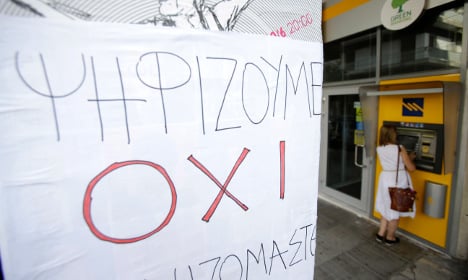Swedish banks are warning holidaymakers heading to Greece to take out money before they travel, following news that all Greek banks are set to be closed for the rest of the week, with cash machine withdrawals limited to €60 a day (equivalent to 550 kronor).
The move should not – in theory – affect foreigners seeking to take money out of international accounts, but Scandinavian banks including SEB and Nordea have advised their customers to plan ahead and exchange their Swedish kronor for euros in advance.
Currency exchange firm Forex told the TT news agency on Monday that it had already seen a sharp rise in the number of Swedes getting euro ahead of of their journeys at Stockholm’s Arlanda airport. Cash machine firm ATB, which allows users to withdraw euros at some of its terminals in Sweden said it also had seen an increase in people opting for the single currency.
“Thanks to extensive news coverage it seems most people know that it's smart to bring a hefty sum of cash,” said Tom Friberg, head of communications at Forex.
He noted that many Swedes may not be used to carrying money around due to the Scandinavian nation’s increasingly cashless society.
“We are spoiled in the Nordic region to be able to use our cards whenever we shop at home. Most people are beginning to learn that this isn’t the case everywhere,” he added.
Read more about the Greece crisis on our sister site The Local Germany
The advice from Swedish banks comes a day after the Swedish foreign ministry warned people flying to Greece that “some restaurants and filling stations haven't accepted card payments for some time and are taking just cash”.
This is because businesses may not want to accept credit cards as they could have trouble accessing their own bank accounts, even if card transactions are authorized.
Meanwhile Sweden’s Prime Minister Stefan Löfven has criticized the Greek parliament’s decision to hold a snap referendum on whether or not the southern European country should remain part of the Eurozone.
“What happened the other day when Greece suddenly said that they wanted a referendum at the eleventh hour, and also believe that the people ought to vote 'no' — that kind of action does not impress me,” he told Swedish Radio.
The Prime Minister was speaking at Sweden's Almedalen Week on Gotland. The political festival was supposed to have been attended by European Commissioner Valdis Dombrovskis ('Commissioner for the euro and social cohesion'), who had to cancel at last minute, presumably to deal with the Greece crisis.




 Please whitelist us to continue reading.
Please whitelist us to continue reading.